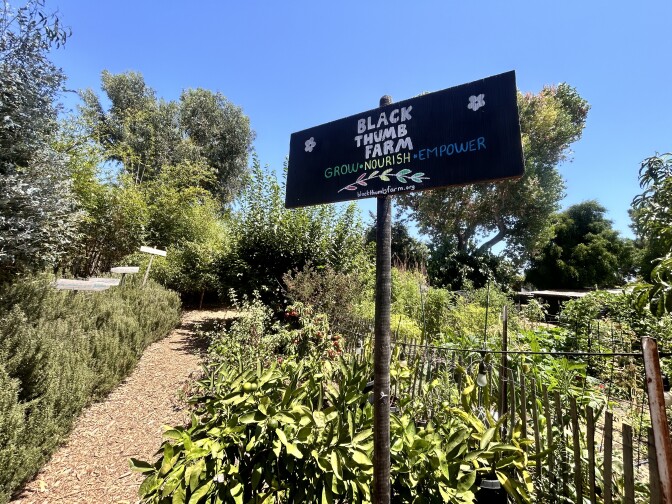This story is free to read because readers choose to support LAist. If you find value in independent local reporting, make a donation to power our newsroom today.
Growing fruits and veggies this spring? Lookout for pesky, invasive flies

As you enjoy the spring gardening season in Southern California, be on the lookout for pesky, invasive pests that could jeopardize local agriculture and ruin more than 250 types of produce.
Parts of Orange County are under an Oriental fruit fly quarantine, and officials are warning people to be wary of the tiny insects after an unprecedented spike in recent years.
Victoria Hornbaker, who directs plant health and pest prevention services at the California Department of Food and Agriculture, told LAist that protecting the state’s agriculture also includes the food you grow at home.
“It reduces quarantines and it also, you know, allows us to continue to have delicious local fruits and vegetables,” she said.
About the current quarantines
Months after officials celebrated the eradication of several fruit fly species last summer, a new quarantine popped up in the Garden Grove area.

There’s also a second quarantine in place for Mediterranean fruit flies further north in parts of Alameda and Santa Clara counties.
If you live in a quarantine area, you shouldn’t move or share fruit, vegetables or soil anywhere off your property — even for family, friends and neighbors. You could accidentally be sharing invasive fruit flies, too.
However, Hornbaker noted both quarantines are tentatively set to be over soon.
“We're looking much better, much more normal than ‘23-24, which was just a real anomaly for us,” she said.
Why it matters
It’s relatively normal for California to see fruit flies, which usually hitch a ride on the treats travelers bring back with them, or on shipments from other states and countries.
The insects are no bigger than a grain of rice, but they can cause tremendous devastation to agriculture, big and small.
For example, if the San Fernando Valley were to get hit with a quarantine, Black Thumb Farm would have to stop sharing hundreds of pounds of produce with families in their community.

Analisa Joh, the organization's co-founder and director of operations, said their student volunteers are “taking home an abundance of food each week,” including zucchini, okra, kale and an array of other fruits and veggies.
Losing fresh bounties like that could deepen the region’s food insecurity crisis. A USC Dornsife study found that 832,000 households in Los Angeles experienced food insecurity last year.
“That's why I always wanna remind folks, it's not just big ag, it's not just what we're growing at farms and in ranches,” Hornbaker said. “It's what people are doing in their backyards, and that's what feeds your families.”
Best practices for your produce
We may start to see more invasive fruit flies around this time of year, when the gardens are growing and the weather is warmer.
You can take several steps at home to prevent the spread of pests, including by only purchasing plants, produce and seeds locally. You can find your nearest licensed nursery here.
Learning what to look for, including maggots and damage, can also help agricultural officials keep fruit flies from spreading.
“ Gosh, if you could get every kid trained up on what to look for for invasive bugs, we'd know everything,” Hornbaker said, adding that you can become “citizen scientists.”
When in doubt, you can call the CDFA Pest Hotline at (800) 491-1899 with any questions you may have. And if officials want to stop by your garden or backyard based on what you’ve seen, CDFA will never charge you, Hornbaker noted.
You can learn more about invasive fruit flies and active quarantines here.











